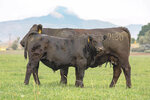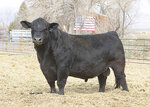Clear, 53° F
For some of the farmers in the region, a long, cold, wet spring was a tough start to the season.
For Powell cattle rancher Quin LaFollette, it led to his best first cutting of hay yet.
"For …
This item is available in full to subscribers.
The Powell Tribune has expanded its online content. To continue reading, you will need to either log in to your subscriber account, or purchase a subscription.
If you are a current print subscriber, you can set up a free web account by clicking here.
If you already have a web account, but need to reset it, you can do so by clicking here.
If you would like to purchase a subscription click here.
Please log in to continue |
|


For some of the farmers in the region, a long, cold, wet spring was a tough start to the season.
For Powell cattle rancher Quin LaFollette, it led to his best first cutting of hay yet.
"For us growing grass and hay it was great," he said, while acknowledging the weather did hamper some of the drying efforts. "You couldn't ask for a better spring."
The evidence of that success is clear to all those who drive along U.S. Highway 14A and pass by Black Summit Cattle west of Ralston. The bales are stacked deep and cattle graze the green grass in the irrigated field below.
LaFollette said the summer has also been good for the second grass cutting and a robust cattle market has been good for his primary business of selling bulls to ranches near and far.
"The summer has been good ... the calves are big and stout," he said.
The ranch finished weaning calves last week, which he said was a little earlier than past years, and he expects them to come in a little heavier than usual.
"All in all it's been a great year so far," he said.
It's also helped cattle ranchers that the number of cattle in the U.S. is still down, which has driven up prices to offset the higher input costs, such as diesel fuel.
LaFollette needs ranchers to do well so they can afford to buy young bulls for their herds. That's especially true as Black Summit works to expand its operation — while they've been selling 80 bulls per year and are planning that again; in the future he plans to sell 100. While some of the bulls in the past have been sold to ranches as far as California and Kansas, he said most will stay right in the Big Horn Basin, helping to enlarge other herds.
It's a responsibility LaFollette takes seriously.
"Any more with the science, to be competitive it's a lot of work," he said, noting that means a lot of investment, a lot of DNA tests to ensure the bulls he's selling don't have problems that could lead to issues down the road, such as bovine heart failure.
"It's just a never ending deal," he said.
They also make sure their seed stock can handle rougher country, even as the cattle spend much of their time on the gentle, well-irrigated fields of the ranch.
"We try and challenge them some, rent pastures in rougher country," he said.
It's a lot of work, but right now, with good weather and high beef prices, it's looking good.